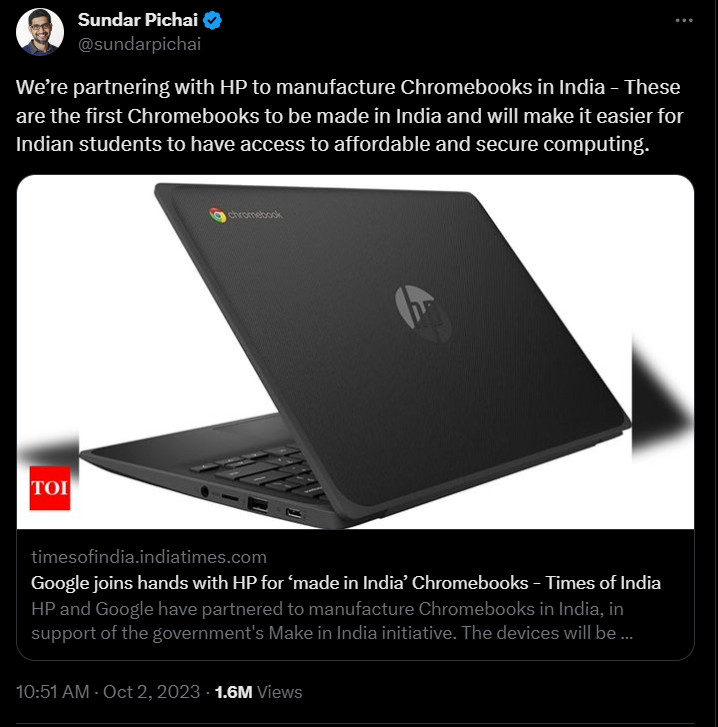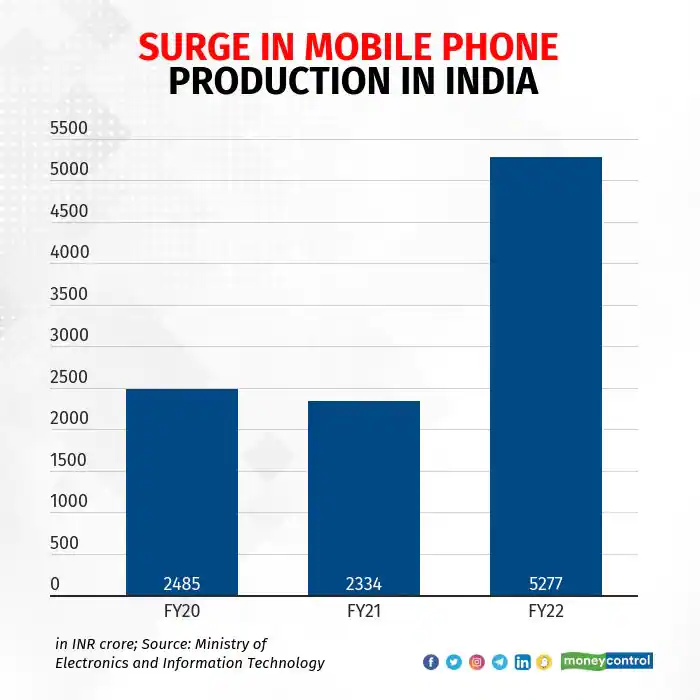Chromebook Made in India laptops will circumvent import ban

- Chromebook laptops made in India will help HP avoid any potential import curbs and improve the state of digital education in India.
- The production, which started this week, is a win for India’s US$2 billion PLI scheme that encourages tech giants to set up a production base locally.
- The Chromebooks are being manufactured at HP’s facility near Chennai.
HP has announced it has begun production on Made in India laptops under the Chromebook badge. The production-linked incentive scheme, which aims to enhance India’s manufacturing capacity and export potential, has had a lackluster start. The government of India eventually imposed — and then postponed — a licensing requirement on the import of laptops and personal computers (PCs). The restrictions may have created momentary chaos, but they eventually resulted in more foreign players registering for the PLI scheme. From here on in, the world can anticipate more Made in India PCs, laptops, and other hardware.
Local media reports quoting government officials indicate that over 40 companies, including Asus, Dell, HP, and Foxconn, have signed up for the scheme. These companies have committed to producing PCs, laptops, tablets, servers, and other equipment. Initially introduced in 2020 for electronics manufacturers, PLIs incentivize domestic and foreign companies to invest in Indian manufacturing and achieve predetermined production targets.
The PLI scheme 2.0, unveiled this May, will allow applicants to choose 2023, 2024, or 2025 as the base year for starting production and envisages an incentive of up to 5% on incremental sales, more than double the roughly 2% being offered under the first phase.
Based on a recent report by The Economic Times, major IT hardware companies like Dell and HP are participating directly in the program, while other significant players such as HPE, Lenovo, Acer, ASUS, and Thomson are taking part through electronic manufacturing service (EMS) companies with manufacturing facilities in India, such as Flextronics and Rising Star.
In a Monday post on X, Alphabet Chief Executive Officer Sundar Pichai announced that Google will begin to make its Chromebook laptops in India through a partnership forged with HP Inc. The announcement by Google marks the latest among global technology companies aiming to expand assembly in the key growth market.

The first Indian Chromebooks – coming soon.
HP explained that the partnership will propel a joint vision: to support the digital education ecosystem in India, and to help more students enhance their learning by providing affordable, safe, and high-quality computing devices to education authorities, schools, and institutions.
To top it off, with ChromeOS at its core, these Chromebooks boast security and accessibility features that make them ideal for classroom environments.
Where will the Made in India Chromebook laptops be manufactured?
HP has a Flex Ltd facility near Chennai in southern India, where the company has been making laptops and desktops since 2020 – and the Chromebooks will be built there. HP noted that Chromebook production started on October 2, 2023. “Chromebooks are typically priced at the lower end of the market and have thin profit margins, making them sensitive to tariff measures,” Bloomberg noted.
That said, local manufacturing allows HP to avoid potential curbs on Chromebook imports. Bani Dhawan, head of education for South Asia at Google, emphasized the company’s ongoing efforts to support the digital transformation of education in India. “The local production of Chromebooks with HP marks an important step in our efforts to support the digital transformation of education in India,” Dhawan said.
“We hope this collaboration will help accelerate the adoption of technology in more schools so that every student and educator have access to the tools and skills to pursue their potential.”
A rise in tech production in India
Lately, India has been witnessing a significant uptick in technology production. Just last month, government sources claimed that Apple Inc. has plans to scale up production in India by over five-fold to around US$40 billion in the next four to five years. The iPhone maker crossed the US$7 billion production mark in its 2022 financial year.
Apple is already manufacturing iPhones in India and plans to start manufacturing Airpods in 2024. A government official quoted by the PTI News said, “It [Apple] doesn’t have any plans to participate in the IT hardware PLI [scheme]. It may come later, but now, its focus is to scale up existing production levels.”
India is yielding results even in the country’s ambitious push for self-sufficiency in mobile phone assembling. The South Asian nation shipped two billion domestically assembled smartphones and feature phones between 2014 and 2022 as part of its Make in India initiative.

Due to the PLI scheme, India is currently one of the fastest-growing mobile phone manufacturers in the world and has emerged as the second-largest manufacturer of mobile handsets in the world in volume term.
According to market and research firm Counterpoint, a staggering 98% of all mobile phone shipments within the Indian market in 2022 were domestically produced, and 16% of the production was exported, compared to a mere 19% of India’s phones being domestically made in 2014, the year Prime Minister Narendra Modi’s administration assumed office.
Modi has courted lots of US tech firms.











